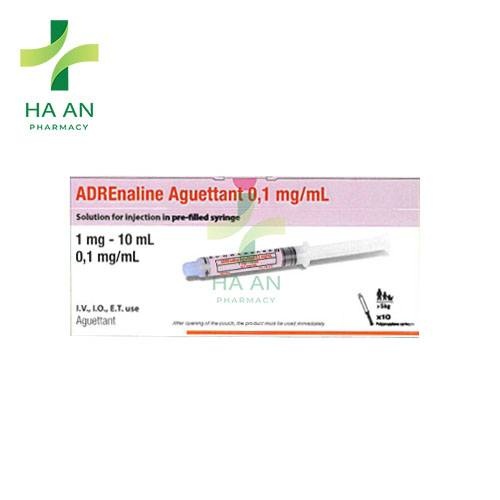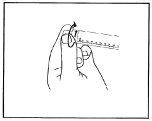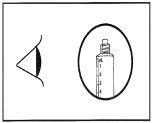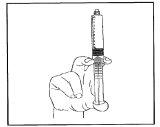
ADRENALINE AGUETTANT 0.1 mg/mL PRE-FILLED SYRINGE SOLUTION FOR INJECTION


How to use ADRENALINE AGUETTANT 0.1 mg/mL PRE-FILLED SYRINGE SOLUTION FOR INJECTION
Translated with AI
This page provides general information and does not replace a doctor’s consultation. Always consult a doctor before taking any medication. Seek urgent medical care if symptoms are severe.
Show originalContents of the leaflet
Introduction
Package Leaflet: Information for the Patient
Adrenaline Aguettant 0.1 mg/ml, Solution for Injection in Pre-filled Syringe
(Hereafter referred to as “Adrenaline Injectable”)
Epinephrine
Read all of this leaflet carefully before you start using this medicine because it contains important information for you.
- Keep this leaflet, you may need to read it again.
- If you have any further questions, ask your doctor, pharmacist, or nurse.
- This medicine has been prescribed for you only. Do not pass it on to others. It may harm them, even if their signs of illness are the same as yours.
- If you get any side effects, talk to your doctor, pharmacist, or nurse. This includes any possible side effects not listed in this leaflet. See section 4.
Contents of the Package Leaflet
- What Adrenaline Injectable is and what it is used for
- What you need to know before you use Adrenaline Injectable
- How to use Adrenaline Injectable
- Possible side effects
- Storage of Adrenaline Injectable
- Contents of the Pack and Further Information
1. What Adrenaline Injectable is and what it is used for
Adrenaline Injectable belongs to a group of medicines called adrenergic and dopaminergic agents.
This medicine is used for:
- Treatment of cardiac arrest (sudden loss of cardiac function, breathing, and consciousness).
- Treatment of acute anaphylaxis in adults (severe shock or collapse caused by a severe allergic reaction).
2. What you need to know before you are given Adrenaline Injectable
You should not be given Adrenaline Injectable
- if you are allergic (hypersensitive) to any of the components of this medicine (listed in section 6), when an alternative presentation of adrenaline or an alternative vasopressor is available.
Warnings and Precautions
Adrenaline Injectable is indicated for emergency treatment. Continuous medical supervision is necessary after administration.
Precautions for Use
The risk of side effects increases if you:
- have a medical history of hyperthyroidism (thyroid gland disease);
- have severe renal insufficiency;
- suffer from hypercalcemia (increased calcium concentration in the blood);
- suffer from hypokalemia (decreased potassium concentration in the blood);
- have diabetes mellitus;
- have heart disease or arterial hypertension;
- have brain damage or hardening of the cerebral arteries;
- have glaucoma (increased pressure in the eye);
- have prostate disorders;
- are an elderly patient;
- are pregnant.
Use in Athletes
Athletes are informed that this medicine contains adrenaline, which may produce a positive result in doping tests.
Use of Adrenaline Injectable with Other Medicines
Tell your doctor if you are taking, have recently taken, or might take any other medicines.
Medicines that may interact with Adrenaline Injectable include:
- halogenated volatile anesthetics (gas used during anesthesia);
- certain antidepressants;
- medicines for treating arterial hypertension, heart conditions;
- medicines for treating diabetes.
Pregnancy and Breastfeeding
If you are pregnant or breastfeeding, think you may be pregnant, or are planning to have a baby, ask your doctor or pharmacist for advice before you are given this medicine.
Driving and Using Machines
Receiving Adrenaline Injectable does not affect your ability to drive or use machines.
Adrenaline Injectable Contains Sodium
This medicine contains 35.4 mg of sodium (main component of cooking/table salt) in each syringe. This is equivalent to 1.77% of the maximum recommended daily intake of sodium for an adult.
3. How Adrenaline Injectable is Administered
Adrenaline Injectable will be administered to you by your doctor, nurse, or healthcare assistant. They will decide the correct amount for you, as well as when and how it should be administered.
In case of potentially life-threatening allergic reactions (acute anaphylaxis):
Adultswill be administered a dose of 0.05 mg (0.5 ml of the 1:10,000 adrenaline solution) as many times as necessary until the desired response is obtained.
In case of cardiac arrest:
Adults:1 mg (10 ml of the 1:10,000 adrenaline solution) will be administered in a vein or in the bone every 3-5 minutes until the heart starts functioning.
Children over 5 kg:10 micrograms/kg (0.1 ml/kg of the 1:10,000 adrenaline solution) will be administered in a vein or in the bone every 3-5 minutes until the heart starts functioning.
This medicine is not suitable for administering a dose less than 0.5 ml and therefore should not be used in newborns or children with a body weight less than 5 kg.
4. Possible Side Effects
Like all medicines, this medicine can cause side effects, although not everybody gets them.
The following side effects have been reported:
- anxiety;
- dyspnea (difficulty breathing);
- nervousness;
- fear;
- sweating;
- palpitations (irregular or accelerated heartbeat);
- tachycardia (increased heart rate);
- pallor;
- tremors;
- weakness;
- dizziness;
- headache;
- nausea;
- vomiting;
- coldness in the extremities;
- hallucinations;
- syncope;
- hyperglycemia (high blood sugar levels);
- hypokalemia (low potassium levels in the blood);
- metabolic acidosis (increased blood acidity);
- mydriasis (pupil dilation).
At high doses or in patients sensitive to adrenaline, the side effects are:
- cardiac arrhythmia (irregular heartbeats/cardiac arrest);
- arterial hypertension (with risk of cerebral hemorrhage);
- vasoconstriction (narrowing of blood vessels, e.g., cutaneous, in extremities, or in kidneys);
- acute angina pectoris;
- risk of acute myocardial infarction.
Repeated local injections can cause necrosis (tissue damage) at the injection sites, as a result of vascular constriction.
In all cases, medical supervision is necessary after administration of Adrenaline Injectable.
Reporting of Side Effects
If you experience any side effects, talk to your doctor, pharmacist, or nurse, even if it is possible side effects not listed in this leaflet. You can also report side effects directly through the Spanish Pharmacovigilance System for Human Use Medicines: www.notificaram.es. By reporting side effects, you can help provide more information on the safety of this medicine.
5. Storage of Adrenaline Injectable
Keep this medicine out of the sight and reach of children.
Do not use this medicine after the expiry date which is stated on the label. The expiry date is the last day of the month stated.
Store in the aluminum bag to protect from light and oxygen.
Do not store above 25°C.
Do not open the aluminum bag until you are about to use it.
After opening the bag, the product should be used immediately.
Do not freeze.
Do not use sharp objects to open the bag.
Do not use Adrenaline Injectable if it has been partially used or shows visible signs of deterioration.
Medicines should not be disposed of via wastewater or household waste. Ask your pharmacist how to dispose of medicines no longer required. This will help protect the environment.
6. Contents of the Pack and Further Information
Composition of Adrenaline Injectable
The active substance is epinephrine (adrenaline):
Each ml of injectable solution contains 0.1 mg of epinephrine (adrenaline), as adrenaline tartrate.
Each 10 ml pre-filled syringe contains 1 mg of epinephrine (adrenaline), as adrenaline tartrate.
The other ingredients are sodium chloride, hydrochloric acid, sodium hydroxide, water for injections.
Appearance of the Product and Pack Contents
Adrenaline Injectable is a clear, colorless solution in a 10 ml pre-filled polypropylene syringe, packaged individually in a transparent blister and wrapped in an aluminum bag.
The pre-filled syringes are available in packs of 1 and 10 syringes.
Not all pack sizes may be marketed.
Marketing Authorization Holder:
Laboratoire Aguettant
1, rue Alexander Fleming
69007 LYON
FRANCE
Manufacturer:
Laboratoire Aguettant
1, rue Alexander Fleming
69007 LYON
FRANCE
Laboratoire Aguettant
Lieu Dit Chantecaille
07340 Champagne
FRANCE
Local Representative:
AGUETTANT IBERICA
C/ Baldini Reixac, 4-8, Torre I, 4º08028, Barcelona-SPAIN
Date of the last revision of this leaflet: July 2024
Detailed and updated information on this medicine is available on the website of the Spanish Agency for Medicines and Health Products (AEMPS) http://www.aemps.gob.es/.
This information is intended only for healthcare professionals:
Intravenous adrenaline should only be administered by those who have experience in the use and adjustment of vasopressor doses in their usual clinical practice.
Cardiopulmonary Resuscitation:
10 ml of 1:10,000 solution (1 mg), intravenously or intraosseously, repeated every 3-5 minutes until spontaneous circulation returns.
Endotracheal use should only be used as a last resort if no other administration route is accessible, at a dose of 20-25 ml of 1:10,000 solution (2-2.5 mg).
In cardiac arrest after cardiac surgery, adrenaline should be administered intravenously in doses of 0.5 ml or 1 ml of 1:10,000 solution (50 or 100 micrograms) with great caution and adjusting the dose until the effect is achieved.
Acute Anaphylaxis:
Adjust the dose using intravenous boluses of 0.5 ml of 1:10,000 solution (0.05 mg) according to the response.
Adrenaline 0.1 mg/ml (1:10,000) solution for injection in pre-filled syringe is not recommended for intramuscular use in cases of acute anaphylaxis. For intramuscular administration, a 1 mg/ml (1:1000) solution should be used.
Pediatric Population:
This medicine is not suitable for administering a dose less than 0.5 ml and therefore should not be used intravenously or intraosseously in newborns and children with a body weight less than 5 kg.
Cardiac Arrest in Children:
Intravenously or intraosseously (only for children over 5 kg): 0.1 ml/kg of 1:10,000 solution (10 micrograms/kg) up to a maximum single dose of 10 ml of 1:10,000 solution (1 mg), repeated every 3-5 minutes until spontaneous circulation returns.
Endotracheal use (in any weight range) should only be used as a last resort if no other administration route is accessible, at a dose of 1 ml/kg of 1:10,000 solution (100 micrograms/kg) up to a maximum single dose of 25 ml of 1:10,000 solution (2.5 mg).
Follow the Following Protocol Strictly:
The pre-filled syringe is intended for a single patient. Dispose of the syringe after use. Do not reuse.
The product should be visually inspected for particles and color changes before administration. Only the clear, colorless solution without particles or precipitates should be used.
The product should not be used if the bag or blister has been opened or if the safety seal of the syringe (plastic cap at the base of the needle cap) is broken.
- Open the aluminum bag with your hand using only the notch(es).
Do not use sharp objects to open the bag.
- Remove the pre-filled syringe from the sterile blister.
- Push the plunger to release the stopper. The sterilization process may have caused the stopper to stick to the syringe body.

- Unscrew the needle cap to break the seal. Do not touch the exposed Luer connection to avoid contamination.

- Check that the syringe seal has been completely removed. If not, replace the cap and turn it again.
 Push the plunger gently to expel the air.
Push the plunger gently to expel the air.
- Connect the syringe to the vascular access device or needle.
Push the plunger to inject the necessary volume.
Disposal of unused medicine and all materials that have come into contact with it will be carried out in accordance with local regulations.
- Country of registration
- Active substance
- Prescription requiredYes
- Manufacturer
- This information is for reference only and does not constitute medical advice. Always consult a doctor before taking any medication. Oladoctor is not responsible for medical decisions based on this content.
- Alternatives to ADRENALINE AGUETTANT 0.1 mg/mL PRE-FILLED SYRINGE SOLUTION FOR INJECTIONDosage form: INJECTABLE, Epinephrine base 1 mg/mlActive substance: epinephrineManufacturer: B Braun Medical S.A.Prescription requiredDosage form: INJECTABLE, 1 mg/mlActive substance: epinephrineManufacturer: Laboratorios Basi Industria Farmaceutica S.A.Prescription requiredDosage form: INJECTABLE, 1 mg/mlActive substance: epinephrineManufacturer: Bradex S.A.Prescription required
Online doctors for ADRENALINE AGUETTANT 0.1 mg/mL PRE-FILLED SYRINGE SOLUTION FOR INJECTION
Discuss questions about ADRENALINE AGUETTANT 0.1 mg/mL PRE-FILLED SYRINGE SOLUTION FOR INJECTION, including use, safety considerations and prescription review, subject to medical assessment and local regulations.
Frequently Asked Questions











